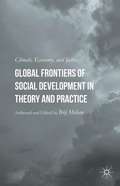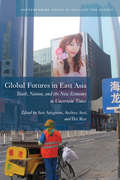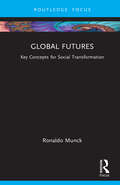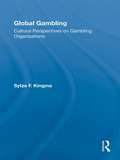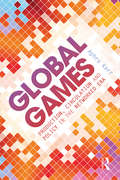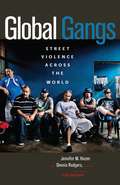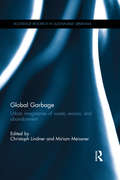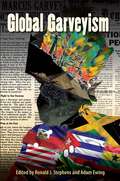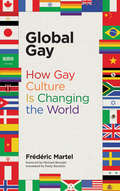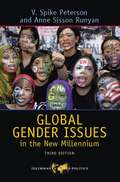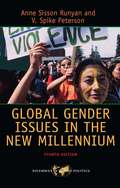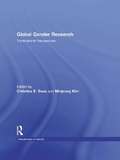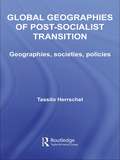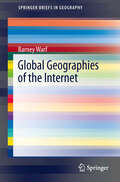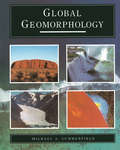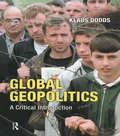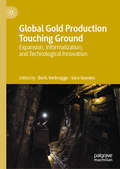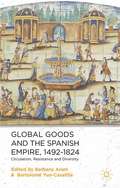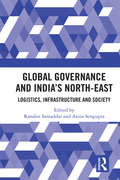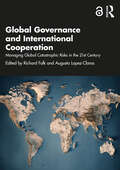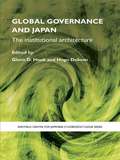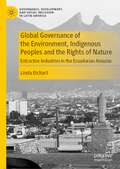- Table View
- List View
Global Frontiers of Social Development in Theory and Practice: Climate, Economy, And Justice
by Brij MohanThis volume examines developmentality and the archeology of its social practices, unfolding systemic failures that muffle progress. Economic, climate, and social justice are the areas of focus for this analysis of human-social development in the fog of ideological-institutional meltdowns.
Global Futures in East Asia: Youth, Nation, and the New Economy in Uncertain Times
by Ann Anagnost Andrea Arai Hai RenThe East Asian economic miracle of the twentieth century is now a fond memory. What does it mean to be living in post-miracle times? For the youth of China, Taiwan, Japan, and South Korea, the opportunities and challenges of the neoliberal age, deeply shaped by global forces in labor markets, powerfully frame their life prospects in ways that are barely recognizable to their parents. Global Futures in East Asiagathers together ethnographic explorations of what its contributors call projects of "life-making. " Here we see youth striving to understand themselves, their place in society, and their career opportunities in the nation, region, and world. While some express optimism, it is clear that many others dread their prospects in the competitive global system in which the failure to thrive is isolating, humiliating, and possibly even fatal. Deeply engaged with some of the most significant theoretical debates in the social sciences in recent years, and rich with rare cross-national comparisons, this collection will be of great interest to all scholars and students interested in the formation of subjects and subjectivities under globalization and neoliberalism.
Global Futures: Key Concepts for Social Transformation (Routledge Critical Development Studies)
by Ronaldo MunckGlobal Futures: Key Concepts for Social Transformation provokes us to rethink some of the key words and concepts which define the current global order. Prompted by crises around the world, it seeks to re-energise our desire for a better future.The book takes seven key concepts from the new global studies and considers how they are used and whether they are adequate for addressing the twenty-first century's increasingly complex global order. The topics covered include widely used concepts such as development, modernity, history, and politics, as well as more unusual themes such as desire, complexity, and alternative futures. The core message of this book is that we need to grasp the complex and contradictory reality behind these important concepts in order to foster a new way of thinking, seeing, and acting for a future fit for human purpose.Written by Ronaldo Munck, a key social theorist and social activist with a Latin American and European background, this book will be perfect for students and researchers of sociology, politics, international relations, and global development.
Global Gambling: Cultural Perspectives on Gambling Organizations (Routledge Advances in Criminology)
by Sytze F. KingmaWhile most research has examined the legal, economic and psychological sides of gambling, this innovative collection offers a wide range of cultural perspectives on gambling organizations. Using both historical and present-day case studies from throughout the world, the authors seriously consider the rituals, symbols, the meanings, values, legitimations, relations (formal as well as informal), and the spaces and artifacts involved in the (re)production of gambling organizations. Contributors not only examine the global influence of commercial gambling, but also demonstrate how the local qualities of gambling organizations remain unique. This volume will be of interest to criminologists, sociologists, anthropologists, and all scholars of gambling.
Global Games: Production, Circulation and Policy in the Networked Era
by Aphra KerrIn the last decade our mobile phones have been infiltrated by angry birds, our computers by leagues of legends and our social networks by pleas for help down on the farm. As digital games have become networked, mobile and casual they have become a pervasive cultural form. Based on original empirical work, including interviews with workers, virtual ethnographies in online games and analysis of industry related documents, Global Games provides a political, economic and sociological analysis of the growth and restructuring of the digital games industry over the past decade. Situating the games industry as both cultural and creative and examining the relative growth of console, PC, online and mobile, Aphra Kerr analyses the core production logics in the industry, and the expansion of circulation processes as game services have developed. In an industry dominated by North American and Japanese companies, Kerr explores the recent success of companies from China and Europe, and the emergent spatial politics as countries, cities, companies and communities compete to reshape digital games in the networked age.
Global Gangs: Street Violence across the World
by Dennis Rodgers Jennifer M. HazenGangs, often associated with brutality and senseless destructive violence, have not always been viewed as inherently antagonistic. The first studies of gangs depicted them as alternative sources of order in urban slums where the state&’s authority was lacking, and they have subsequently been shown to be important elements in some youth life cycles. Despite their proliferation there is little consensus regarding what constitutes a gang. Used to denote phenomena ranging from organized crime syndicates to groups of youths who gather spontaneously on street corners, even the term &“gang&” is ambiguous. Global Gangs offers a greater understanding of gangs through essays that investigate gangs spanning across nations, from Brazil to Indonesia, China to Kenya, and from El Salvador to Russia. Volume editors Jennifer M. Hazen and Dennis Rodgers bring together contributors who examine gangs from a comparative perspective, discussing such topics as the role the apartheid regime in South Africa played in the emergence of gangs, the politics behind child vigilante squads in India, the relationship between immigration and gangs in France and the United States, and the complex stigmatization of youths in Mexico caused by the arbitrary deployment of the word &“gang.&” Featuring an afterword by renowned U.S. gang researcher Sudhir Venkatesh, this volume provides a comprehensive look into the experience of gangs across the world and in doing so challenges conventional notions of identity. Contributors: Enrique Desmond Arias, George Mason U; José Miguel Cruz, Florida International U; Steffen Jensen, DIGNITY–Danish Institute Against Torture; Gareth A. Jones, London School of Economics and Political Science; Marwan Mohammed, École Normale Supérieure, Paris; Jacob Rasmussen, Roskilde U; Loren Ryter, U of Michigan; Rustem R. Safin, National Research Technological U, Russia; Alexander L. Salagaev, National Research Technological U, Russia; Atreyee Sen, U of Manchester; Mats Utas, Nordic Africa Institute; Sudhir Venkatesh, Columbia U; James Diego Vigil, U of California, Irvine; Lening Zhang, Saint Francis U.
Global Garbage: Urban imaginaries of waste, excess, and abandonment (Routledge Research in Sustainable Urbanism)
by Christoph Lindner Miriam MeissnerGlobal Garbage examines the ways in which garbage, in its diverse forms, is being produced, managed, experienced, imagined, circulated, concealed, and aestheticized in contemporary urban environments and across different creative and cultural practices. The book explores the increasingly complex relationship between globalization and garbage in locations such as Beirut, Detroit, Hong Kong, London, Los Angeles, Manchester, Naples, Paris, Rio de Janeiro and Tehran. In particular, the book examines how, and under what conditions, contemporary imaginaries of excess, waste, and abandonment perpetuate – but also sometimes counter – the imbalances of power that are frequently associated with the global metropolitan condition. This interdisciplinary collection will appeal to the fields of anthropology, architecture, film and media studies, geography, urban studies, sociology, and cultural analysis.
Global Garveyism
by Adam Ewing Ronald J. StephensIlluminating the global impact of Marcus Garvey's Black nationalist philosophy Arguing that the accomplishments of Jamaican activist Marcus Garvey and his followers have been marginalized in narratives of the Black freedom struggle, this volume builds on decades of overlooked research to reveal the profound impact of Garvey’s post–World War I Black nationalist philosophy around the globe and across the twentieth century. These essays point to the breadth of Garveyism’s spread and its reception in communities across the African diaspora, examining the influence of Garvey’s Universal Negro Improvement Association (UNIA) in Africa, Australia, North America, and the Caribbean. They highlight the underrecognized work of many Garveyite women and show how the UNIA played a key role in shaping labor unions, political organizations, churches, and schools. In addition, contributors describe the importance of grassroots efforts for expanding the global movement—the UNIA trained leaders to organize local centers of power, whose political activism outside the movement helped Garvey’s message escape its organizational bounds during the 1920s. They trace the imprint of the movement on long-term developments such as decolonization in Africa and the Caribbean, the pan-Aboriginal fight for land rights in Australia, the civil rights and Black Power movements in the United States, and the radical pan-African movement. Rejecting the idea that Garveyism was a brief and misguided phenomenon, this volume exposes its scope, significance, and endurance. Together, contributors assert that Garvey initiated the most important mass movement in the history of the African diaspora, and they urge readers to rethink the emergence of modern Black politics with Garveyism at the center. Contributors: Ronald J. Stephens | Adam Ewing | Keisha N. Blain | Nicole Bourbonnais | José Andrés Fernández Montes de Oca | John Maynard | Erik S. McDuffie | Frances Peace Sullivan | Robert Trent Vinson | Michael O. West
Global Gay: How Gay Culture Is Changing the World (The\mit Press Ser.)
by Frederic MartelA panoramic view of gay rights, gay life, and the gay experience around the world.In Global Gay, Frédéric Martel visits more than fifty countries and documents a revolution underway around the world: the globalization of LGBT rights. From Saudi Arabia to South Africa, from Amsterdam to Tel Aviv, from Singapore to the United States, activists, culture warriors, and ordinary people are part of a movement. Martel interviews the proprietor of a “gay-friendly” café in Amman, Jordan; a Cuban-American television journalist in Fort Lauderdale, Florida; a South African jurist who worked with Nelson Mandela to enshrine gay rights in the country's constitution; an American lawyer who worked on the campaign for marriage equality; an Egyptian man who fled his country after escaping a raid on a gay club; and many others. He tells us that in China, homosexuality is neither prohibited nor permitted, and that much Chinese gay life takes place on social media; that in Iran, because of the strict separation of the sexes, it seems almost easier to be gay than heterosexual; and that Raul Castro's daughter, a gay rights icon in Cuba, expressed her lingering anti-American sentiments by calling for Pride celebrations in May rather than June. Ten countries maintain the death penalty for homosexuals. “Homophobia is what Arab governments give to Islamists to keep them calm,” one activist tells Martel.Martel finds that although the “gay American way of life” has created a global template for gay activism and culture, each country offers distinctly local variations. And around the world, the status of gay rights has become a measure of a country's democracy and modernity.This English edition, which has been thoroughly revised and updated, has received the French Voices Award for excellence in publication and translation, supported by a grant from the French-American Book Fund.
Global Gender Issues in the New Millennium
by V. Spike Peterson Anne Sisson RunyanWritten by Peterson (political science, U. of Arizona) and Runyan (women's, gender, and sexuality studies, U. of Cincinnati), this textbook on global gender issues is reflective of the contemporary feminist international relations scholarship typically found in the pages of the International Feminist Journal of Politics as combined with recent work in transnational feminist inquiry more generally. Chapters address: analyzing world politics through a gendered lens, gender and global governance, gender and global security, gender and global political economy, and gendered resistance politics. Annotation ©2009 Book News, Inc. , Portland, OR (booknews. com)
Global Gender Issues in the New Millennium
by V. Spike Peterson Anne Sisson RunyanGlobal Gender Issues in the New Millennium argues that the power of gender works to help keep gender, race, class, sexual, and national divisions in place despite increasing attention to gender issues in the study and practice of world politics. Accessible and student-friendly for both undergraduate and graduate courses, authors Anne Sisson Runyan and V. Spike Peterson analyze gendered divisions of power and resources that contribute to the worldwide crises of representation, violence, and sustainability. They emphasize how hard-won attention to gender equality in world affairs can be co-opted when gender is used to justify or mystify unjust forms of global governance, international security, and global political economy.In the new and updated fourth edition, Runyan and Peterson examine the challenges of forging transnational solidarities to de-gender world politics, scholarship, and practice through renewed politics for greater representation and redistribution. Yet they see promise in coalitional struggles to re-radicalize feminist world political demands to change the downward conditions of women, men, children, and the planet. Updated to include framing questions at the opening of each chapter, discussion questions and exercises at the end of each chapter, and updated data on gender statistics and policymaking. Chapters One and Two have also been revised to provide more support to readers with less of a background in gender politics. Case studies and web resources are now also provided.
Global Gender Issues in the New Millennium
by V. Spike Peterson Anne Sisson RunyanGlobal Gender Issues in the New Millennium connects the inequalities between and among women and men with the world politics of global governance, security, political economy, and ecology. Through historical, theoretical, and empirical analysis, the authors alert us to gendered divisions of power, violence, labor and resources, as well as the power of gender as a meta-lens that keeps gender, race, class, sexual, and national divisions in place, despite some re-positionings of some women and men on the world political stage. In this completely new edition, which reflects significant advances in feminist international relations and transnational feminist scholarship, the authors apply intersectional analysis to global governance, militarization, global economic restructuring, and environmental degradation. They explore how crises of representation, insecurity, and sustainability have widened and deepened--particularly in the post-9/11 period--while at the same time global gender policymaking (quotas, gender mainstreaming, and the advancing of women's human rights) has increased. The authors focus on this apparent contradiction--the higher level of attention to gender and women's human rights in a time of fierce militarization, savage economic inequality, and ecological crisis--but also address how the power of gender, as a meta-lens that orders world politics, can be deconstructed to rethink identities, ideologies, structures, and policies that rest upon gendered processes of imperialism, neoliberalism, racialization, and sexualization. The book emphasizes how hard-won attention to gender equality in world affairs can be co-opted when gender is used to justify or mystify unjust global governance, global security, and global political economy, but at the same time sees promise in coalitional struggles to re-radicalize feminist world political demands to change the downward conditions of women, men, children, and the planet. Thus, the authors also examine the challenges of forging transnational solidarities to de-gender world politics, scholarship, and practice through renewed politics of representation and redistribution.
Global Gender Issues in the New Millennium
by V. Spike Peterson Anne Sisson RunyanGlobal Gender Issues in the New Millennium connects the inequalities between and among women and men with the world politics of global governance, security, political economy, and ecology. Through historical, theoretical, and empirical analysis, the authors alert us to gendered divisions of power, violence, labor and resources, as well as the power of gender as a meta-lens that keeps gender, race, class, sexual, and national divisions in place, despite some re-positionings of some women and men on the world political stage. In this completely new edition, which reflects significant advances in feminist international relations and transnational feminist scholarship, the authors apply intersectional analysis to global governance, militarization, global economic restructuring, and environmental degradation. They explore how crises of representation, insecurity, and sustainability have widened and deepened--particularly in the post-9/11 period--while at the same time global gender policymaking (quotas, gender mainstreaming, and the advancing of women's human rights) has increased. The authors focus on this apparent contradiction--the higher level of attention to gender and women's human rights in a time of fierce militarization, savage economic inequality, and ecological crisis--but also address how the power of gender, as a meta-lens that orders world politics, can be deconstructed to rethink identities, ideologies, structures, and policies that rest upon gendered processes of imperialism, neoliberalism, racialization, and sexualization. The book emphasizes how hard-won attention to gender equality in world affairs can be co-opted when gender is used to justify or mystify unjust global governance, global security, and global political economy, but at the same time sees promise in coalitional struggles to re-radicalize feminist world political demands to change the downward conditions of women, men, children, and the planet. Thus, the authors also examine the challenges of forging transnational solidarities to de-gender world politics, scholarship, and practice through renewed politics of representation and redistribution.
Global Gender Research: Transnational Perspectives (Perspectives on Gender)
by Christine Bose Minjeong KimReaders of Global Gender Research will learn to compare and contrast feminist concerns globally, gain familiarity with the breadth of gender research, and understand the national contexts that produced it. This volume provides an in-depth comparative picture of the current state of feminist sociological gender and women's studies research in four regions of the world—Africa, Asia, Latin America/the Caribbean, and Europe—as represented by many countries. The introductory essay to each region explains how social science research on women and/or gender issues has been shaped by economics, politics, and culture, and by trends that are simultaneously local, regional, and global. It familiarizes readers with the wide range of salient issues, research methods, writing styles, and leading authors from around the globe. Each regional section includes several chapters on gender research in specific countries that represent the region's diversity and cover the major theoretical and empirical trends that have emerged over time, as well as the relationship of key research questions to feminist activism and women’s or gender studies. Next, the editors illustrate this new wave of gender scholarship with translated/reprinted samples of research articles from additional countries in the region, that cover a wide range of important global topics—such as work, sexuality, masculinities, childcare and family issues, religion, violence, law and gender policies. Finally, this volume provides scholars with extensive bibliographies and a listing of web sites for women’s and gender research centers in 85 countries.
Global Geographies of Post-Socialist Transition: Geographies, societies, policies (Routledge Studies in Human Geography)
by Tassilo HerrschelSince the formal raising of the Iron Curtain, there has been much interest in post-socialism and the process of post-socialist transition. This timely book provides a systematic review and analysis of the process of ‘transition’. Herrschel: explores recent theories, concepts and debates on post-socialism and the notion of transition provides a systematic, topical account of post-socialist transitions around the world, as evidence by social, economic, and political processes examines case studies of post-socialist transition in east and Central Europe, the former Soviet Union, Asia and South-East Asia, and Africa and Latin America brings together theoretical and practical aspects by examining what lessons can be learned from recent experiences. Global Geographies of Post-Socialist Transition provides a truly global comparative account of the meaning and processes of post-socialist transition and will be an invaluable resource for all those interested in this area.
Global Geographies of the Internet
by Barney WarfToday, roughly 2 billion people use the internet, and its applications have flourished in number and importance. This volume will examine the growth and geography of the internet from a political economy perspective. Its central motivation is to illustrate that cyberspace does not exist in some aspatial void, but is deeply rooted in national and local political and cultural contexts. Toward that end, it will invoke a few major theorists of cyberspace, but apply their perspectives in terms that are accessible to readers with no familiarity with them. Beyond summaries of the infrastructure that makes the internet possible and global distributions of users, it delves into issues such as the digital divide to emphasize the inequalities that accompany the growth of cyberspace. It also addresses internet censorship, e-commerce, and e-government, issues that have received remarkably little scholarly attention, particularly from a spatial perspective. Throughout, it demonstrates that in cyberspace, place matters, so that no comprehensive understanding of the internet can be achieved without considering how it is embedded within, and in turn changes, local institutional and political contexts. Thus the book rebuts simplistic "death of distance" views or those that assert there is, or can be, a "one-size-fits-all, cookie-cutter" model of the internet applicable to all times and places.
Global Geomorphology
by Michael A. SummerfieldThe plate tectonics revolution in the earth sciences has provided a valuable new framework for understanding long-term landform development.This innovative text provides a comprehensive introduction to the subject of global geomorphology, with the emphasis placed on large-scale processes and phenomena. Integrating global tectonics into the study of landforms and incorporating planetary geomorphology as a major component the author discusses the impact of climatic change and the role of catastrophic events on landform genesis and includes a comprehensive study of surface geomorphic processes.
Global Geopolitics: A Critical Introduction
by Klaus J. DoddsEmploying thematic investigation and illustrated through case studies, Dodds explores how global politics is imagined and practised by countries such as the US and other organisations including Greenpeace, the IMF and CNN International.In addition, the author discusses how issues such as environmental degradation, terror networks, anti-globalisation protests and North-South relations challenge, consolidate and subvert the existing international political system.
Global Gold Production Touching Ground: Expansion, Informalization, and Technological Innovation
by Sara Geenen Boris VerbruggeIn recent decades, gold mining has moved into increasingly remote corners of the globe. Aside from the expansion of industrial gold mining, many countries have simultaneously witnessed an expansion of labor-intensive and predominantly informal artisanal and small-scale gold mining. Both trends are usually studied in isolation, which contributes to a dominant image of a dual gold mining economy. Counteracting this dominant view, this volume adopts a global perspective, and demonstrates that both industrial gold mining and artisanal and small-scale gold mining are functionally integrated into a global gold production system. It couples an analysis of structural trends in global gold production (expansion, informalization, and technological innovation) to twelve country case studies that detail how global gold production becomes embedded in institutional and ecological structures.
Global Goods and the Spanish Empire, 1492–1824
by Bartolomé Yun-Casalilla Bethany AramDrawing upon economic history, cultural studies, intellectual history and the history of science and medicine, this collection of case studies examines the transatlantic transfer and transformation of goods and ideas, with particular emphasis on their reception in Europe.
Global Governance and India’s North-East: Logistics, Infrastructure and Society
by Ranabir Samaddar Anita SenguptaThis book maps the convergence of governance and connectivity within Asia established through the spatial dynamics of trade, capital, conflict, borders and mobility. It situates Indian trade and governance policies within a broader Asian and global context. Focussing on India’s North-East, in particular on India’s Look and Act East Policy, the volume underscores how logistical governance in the region can bring economic and political transformations. It explores the projected development of the North-East into a gateway of transformative cultural interaction among people, just as the Silk Road became a conduit for Buddhism to travel along with musical instruments and tea. Comprehensive and topical, this book will be useful for scholars and researchers of political studies, international relations, governance studies, development studies, international trade and economics and for think tanks working on South and Southeast Asia.
Global Governance and International Cooperation: Managing Global Catastrophic Risks in the 21st Century
by Augusto Lopez-Claros Richard FalkThe Global Governance Forum and the Global Challenges Foundation collaborate in this collection in their concern that the UN Charter and the contemporary infrastructure for international cooperation are no longer fit for purpose and lack the instruments, resources and legitimacy to address the catastrophic risks threatening our future.Twenty-eight contributors offer thoughtful proposals for reforming existing international institutions and creating new ones to build a more peaceful, prosperous and just world, covering themes such as the management of weapons of mass destruction, collective security arrangements, justice and equity in economics, human rights, migration and refugees, climate mitigation, and food security, all bearing on the health of both people and planet.The vital project of this century is building institutions that will underpin global governance in coming decades, requiring imagination, persistence, empathy, and confidence that we will find a path to enhanced mechanisms of binding international law and the resources to make that happen. The volume is essential reading for scholars and researchers on international politics and public policy and indispensable for diplomats and government agencies.
Global Governance and Japan: The Institutional Architecture (The University of Sheffield/Routledge Japanese Studies Series)
by Glenn D. Hook Hugo DobsonLeading specialists from Europe and Japan examine the institutional mechanisms of governance at the global level and provide concrete evidence of the role Japan plays in these institutions. An excellent introduction to the concept of global governance, the volume analyzes how global governance actually works through the global institutional mechanisms of governance. It provides an up-to-date and contemporary analysis of the six most important global institutions, namely: the Group of 7/8 the Organisation for Economic Cooperation and Development the World Bank the International Monetary Fund the World Trade Organization the United Nations. Written clearly and concisely, the book provides a thorough and accessible discussion on Japan’s role within these institutions and uses supporting case studies to ask whether Japan is reactively or proactively involved in trying to shape these institutions in order to promote its own interests. As such, it will be a valuable resource for undergraduates and scholars with an interest in global governance, Japanese politics and political economy.
Global Governance of the Environment, Indigenous Peoples and the Rights of Nature: Extractive Industries in the Ecuadorian Amazon (Governance, Development, and Social Inclusion in Latin America)
by Linda EtchartThis book explores the obstacles facing indigenous communities, non-governmental organizations, governments, and international institutions in their attempts to protect the cultures of indigenous peoples and the world’s remaining rainforests.Indigenous peoples are essential as guardians of the world’s wild places for the maintenance of ecosystems and the prevention of climate change. The Amazonian/Andean indigenous philosophies of sumac kawsay/suma qamaña (buen vivir) were the inspiration for the incorporation of the Rights of Nature into the Ecuadorian and Bolivian constitutions of 2008 and 2009. Yet despite the creation of the United Nations Permanent Forum on Indigenous Issues (2000), and the adoption of the United Nations Declaration on the Rights of Indigenous Peoples (2007), indigenous peoples have been marginalized from intergovernmental environmental negotiations. Indigenous environment protectors’ lives are in danger while the Amazon rainforests continue to burn.By the third decade of the 21st century, the dawn of “woke” capitalism was accompanied by the expansion of ethical investment, with BlackRock leading the field in the “greening” of investment management, while Big Oil sought a career change in sustainable energy production. The final chapters explain the confluence of forces that has resulted in the continued expansion of the extractive frontier into indigenous territory in the Amazon, including areas occupied by peoples living in voluntary isolation.Among these forces are legal and extracurricular payments made to individuals, within indigenous communities and in state entities, and the use of tax havens to deposit unofficial payments made to secure public contracts. Solutions to loss of biodiversity and climate change may be found as much in the transformation of global financial and tax systems in terms of transparency and accountability, as in efforts by states, intergovernmental institutions and private foundations to protect wild areas through the designation of national parks, through climate finance, and other “sustainable” investment strategies.
Global Guyana: Shaping Race, Gender, and Environment in the Caribbean and Beyond
by Oneka LaBennettExposes the global threat of environmental catastrophe and the forms of erasure that structure Caribbean women’s lives in the overlooked nation of GuyanaPreviously ranked among the hemisphere’s poorest countries, Guyana is becoming a global leader in per capita oil production, a shift which promises to profoundly transform the nation. This sea change presents a unique opportunity to dissect both the environmental impacts of modern-world resource extraction and the obscured yet damaging ways in which intersectional race and gender formations circumscribe Caribbean women’s lives.Drawing from archival research and oral history, and examining mass-mediated flashpoints across the African and Indian diasporas—including Rihanna’s sonic routes, ethnic conflict reportage, HBO’s Lovecraft Country, and Netflix’s Indian Matchmaking—Global Guyana repositions this marginalized nation as a nexus of social and economic activity which drives popular culture and ideas about sexuality while reshaping the geopolitical and literal topography of the Caribbean region. Oneka LaBennett employs the powerful analytic of the pointer broom to disentangle the symbiotic relationship between Guyanese women’s gendered labor and global racial capitalism. She illuminates how both oil extraction and sand export are implicated in a well-established practice of pillaging the Caribbean’s natural resources while masking the ecological consequences that disproportionately affect women and children.Global Guyana uncovers how ecological erosion and gendered violence are entrenched in extractive industries emanating from this often-effaced but pivotal country. Sounding the alarm on the portentous repercussions that ambitious development spells out for the nation’s people and its geographical terrain, LaBennett issues a warning for all of us about the looming threat of global environmental calamity.
